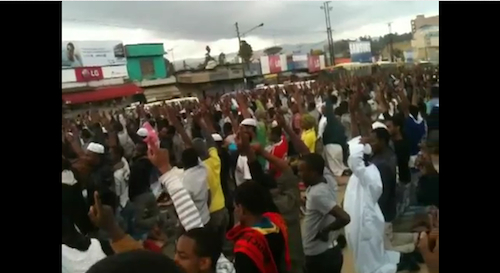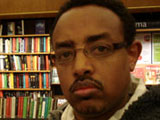Silence is Loud
by Mesfin Negash / August 24, 2012 / 1 Comment
Protests for religious freedom in Ethiopia are marked by silence

A silent protest held on July 27th at the Grand Anwar Mosque in Addis Ababa. Photo: Youtube user Sefir Islam.
This is the end of Ramadan, the fasting season for Muslims around the world. Ethiopian Muslims, however, had another reason to celebrate. They have been peacefully demonstrating for eight months now against the government’s relentless provocation. They have stood firm, organized, peaceful, clear, and persistent both in their demands and rules of engagement. Hundreds of thousands participate in these peaceful demonstrations, held every Friday during the weekly prayer.

- Why does a country with her own unique alphabet and long history of writing persist to deny citizens the right to freedom of expression in this era of Expression? No other country in Africa may typify this paradox more than Ethiopia. As Leopold Senghor’s famous collection of poems entitled “Ethiopiques” remained ‘powerful and popula’ so does the source of his intriguing title, Ethiopia, in her own ways. In “Ethiopiques,” I share Ethiopian views on pertinent issues related to journalism, culture and, of course, the overarching subject of politics.

- Mesfin Negash is an Ethiopian journalist living in exile in Sweden. He is one of the journalists accused of “terrorism” in 2011 by the Ethiopian government. The co-founder and first editor-in-chief of an acclaimed Ethiopian newspaper, Addis Neger, he is currently the Managing Editor of Addisnegeronline.com. He is a political science student by training and known for his critical commentaries on significant political and social issues.
The demonstrators are calling for the government to respect the constitution, nothing more, nothing less. Their first demand is to restore the right for Muslims to elect leaders of the Ethiopian Islamic Affairs Supreme Council (EIASC). Currently, the government picks and assigns individuals to important posts in the council. The second demand is for the government to stay away from favoring one religious sect over another and illegally meddling in the internal affairs of the EIASC and Muslims. These demands are hinged on two constitutionally recognized rights: Religious freedom and separation of state and religion.
So far the government has been trying to quash the protest, accusing the demonstration’s leaders of “extremism” and “having links with terrorists and external funding sources…” further fueling anger among Muslims. Many of those who were elected to represent the protesters are in prison, charged with committing serious crimes. Authorities have also cracked down on the Muslim press. Despite the imprisonment of their leaders, however, Muslims continue their peaceful protest with incredible discipline and organization.
The government is using all available means to divide Muslims and keep non-Muslims at bay, indifferent to the plight and legitimate demands of their fellow citizens. But the propaganda war against the Muslims pushing for more religious freedom and an independent Islamic Council is, by implication, against all religious institutions.
Still, the global threat of “extremist” and “radical” groups echoes in Ethiopia as it does in any other country. Ethiopia has indeed witnessed alarming incidents in the last decade, and some observers agree with the government. However, the trick the government is trying to play is mixing the threat of “radicalism” with quite different, legitimate questions such as the ones we have in hand.
By the time this article is published, more Muslims might be arrested or released from prison. Peaceful demonstrations, however, with their inspiring online and grassroots activism, are to remain part of the weekly ritual for some time. One brilliant rule of engagement that the demonstrators have implemented is keeping silent, by which they deny government security forces and agent provocateurs the chance to start a physical confrontation. They keep silent but stand up for freedom and rule of law. If the government succeeds in its crackdown, it won’t signify anything new but a higher level of silence, a louder silence.
P.S. My readers may remember my last blog, entitled “Dead Until Proven Alive.” By the time you read this post, the death of the Ethiopian PM will have been officially confirmed. He had tested, as I imagined, the reversed presumption of being considered dead until proved alive.





One Comment on "Silence is Loud"
Thanks on your marvelous posting! I genuinely enjoyed reading it, you can be a great
author. I will remember to bookmark your blog and
definitely will come back later on. I want to encourage one to continue your
great posts, have a nice evening!